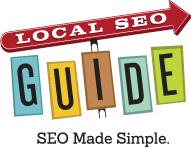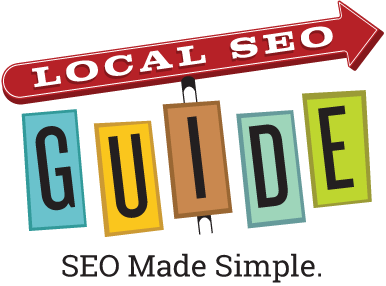Aaron Wall likely increased the amount communication between SEOs and their clients the other day with his post speculating about Google’s new algorithm that favors brands in the SERPS. As usual this got me thinking about what the implications are for local search and my initial reaction is (as always) local search is where you want to be baby!
- How does Google define a local brand?
There’s all sorts of speculation about the signals Google is using to define a site as being a brand that deserves boosting. Over the past year local search has seen a number of these types of signals play a part in rankings – see Matt McGee’s musings on why trust matters for SEO and David Mihm’s excellent Citation is the New Link for an elaboration on how Google may be using mentions of local brands on web pages as a proxy for links. In a world where many small businesses don’t have websites and those that do have few inbound links, this may in fact be a great way to judge how to rank one SMB site v another, all other things being equal. While I am sure my buds at Google have worked hard on this formula, it doesn’t seem particularly hard to game. The fact is that it’s just plain hard to define the strength of a local brand using an algorithm. So my initial reaction is that local search is where you have the greatest opportunity to play against the brand algo. - National-Local Brands May Have a Momentary Advantage
IYPs and companies that have a national/local presence (e.g. car rental, starbucks, etc.) might receive some benefit from the new algo. It will be interesting to see if “branded” IYPs like Yellowpages.com, Superpages and Yelp see any lift from this change v. startups like GetFave, CitySquares, Click2Connect, Centerd, etc. Most IYPs all have similar datasets and the only things that distinguish them are their brands, architecture, inbound links and user generated content. My guess is that the start-ups are going to have to do an even better job of generating links and creating unique content, but because of the difficulty in determining strong local brands, there will still be a big area of opportunity targeting the categories that do not have strong national-local brands (think upholsterers, taxis, dry cleaners, etc. which are the majority of yellow pages categories). In the case of national-local brands like Starbucks and car rental co’s, I think these guys will be able to do even better in the SERPs against local brands, but it’s not like these companies aren’t already strong local brands (online and off) and are already kicking mom’s and pop’s asses. - SMBs Have The Most To Gain
My unifying theory of the universe is that the search engines are on the path to favoring SMB websites (when I say SMB I actually mean truly local sites – Starbucks is in there too) in as many local-oriented queries as possible. If many searches are indeed local in intent then this only makes sense. So in this brave new brand algo world the path forward for SMBs seems to be to keep listening to your SEO guy. Do all of the good onpage SEO stuff. Build up quality inbound links to your site and make sure that your data is up to date on all local search sites and other relevant media. The more you can look like a local brand and a local website the better it will be for you.
In short, I don’t think this new brand algo changes the game substantially in local (of course I reserve the right to delete this post after running a few tests). Damn the torpedoes and full speed ahead.
Other interesting posts on the brand algorithm update:
Google’s Big Brand Bump Bailout – Todd Malicoat (Great headline Todd)
Big Brand Shift on Google – Good, Bad or In Between? – Sphinn
Is Google Giving More Offline Brand Authority in SERPs? – Webmaster World
Is Google Using Brands to Get Content Producers? – Lisa Barone



18 Response Comments
Andrew,
I’ve seen primary keywords most affected by the brand update… cell phones etc. Although I haven’t noticed it affecting local at all – I hope that IYPs don’t gain even more of the same type of positive influence from the algo.
I completely agree that local is where it’s at… for now at least. It’s time to strengthen my local placements as much as possible to blend in just in case the brand plague affects us as well.
I have one regional client with about 15 locations who has seen a major spike in traffic and inquiries since 2/1 (shortly after Aaron speculates the update occurred). It resulted in a nice bonus for me, even though I literally hadn’t touched their website in about two months.
It could be totally unrelated to the update. But there’s also a decent chance that even though this company is by no means on the order of Starbucks or Public Storage, all of the citation work I’ve done for them in the past year is really starting to pay off as a result of this recent update.
And if all the other results are the “bigger brand” or IYP sites, my mom n’ pop-type client might seem more attractive to click on just because it’s different.
Validation that SMB’s should continue to “listen to their SEO guy” (or gal–don’t forget about Miriam & Mary Bowling! :D)
“guy” is such a transgender term these days. So to Miriam & Mary I say “no offense guys”.
Andrew, I’ve always thought it a compliment to be considered “one of the guys” Thanks!
I’ve been scratching my head over this since the “brand algorithm” took effect and trying to get a grasp on how it will effect local, in particular for SMB’s. Meanwhile I’ve seen no real changes in rankings for client sites. Those with top rankings still have them, and those that were a bit farther down may have moved up one or two spots, but that may or may not be brand effects.
But I’m also of the thought that in the long run the SMB’s with their own website, well optimized and linked of course, will rule local queries.
So then, local queries, with a city name stuck before or after the main keyword or phrase, does that fall into the realm of the ‘brand’??
And are we basically back into the days of heavier use of exact keyword/phrase anchor text on back links???
Lots of questions about how this’ll play out in local, and how much so.
I think the city name will be one indicator but likely not as important as local citations over time. Of course until a category has a strong citation profile, city name and targeted backlinks are the way to go.
I wonder if there might be a LSI (latent semantic indexing) component to this new branding algorithm? For the example of ‘car insurance’, State Farm is a huge brand in that space. Many of the pages linking to State Farm, or just mentioning the brand without links, include many references to various forms of insurance, though the link to their site will often just be the brand name in the anchor.
Therefore that brand is well recognized amongst insurance products. By that reasoning it will be good for the big national/local brands operating in one key market, like the car rental companies. But in the case of the IYP sites, they may be a big brand but their brand does not directly associate with the wide variety of businesses in their directories.
Is ‘philadelphia dentist’ a recognizable part of the YellowPages brand? Or ‘san diego beauty salon’ strongly associated with the Yelp brand? No, they’re not.
Will be interesting to see comscore/hitwise/alexa data for the IYPs in 3 months from now. Will they take a hit? And Google take more market share away from them?
Interesting thoughts Stever. Of course if you consider a more complex LSI model then you would also weight terms like “yellow pages”, “business directory” etc. Also I imagine that the big IYPs all have a considerable amount of inbound links to individual business profile pages and city+category pages that will help them out. Their internal linking may be the strongest indicator though.
That said, per my theory of the universe, I do think in the long run IYPs are toast in search, and your thinking supports this.
In an LSI model, of course terms like ‘yellow pages and ‘business directory’ would work well for the IYP sites. Those are the keyword associations with their brands. But it’s the long tail traffic of ‘city name + business type’ where they could loose a lot in a branding algo. It could have a diluting effect for the IYP brands??
I define those terms as long tail relative to a big IYP directory site, and would represent a monstrous proportion of their traffic. The exact same term is certainly short tail for the particular SMB site itself targeting such terms.
Hmmm, niche IYPs focused on one segment, or industry? You could build a brand around that.
I guess I was thinking that these yellow pages terms would have some kind of second order effect in a LSI model as they have a connection to all types of local business searches.
Yes niche IYPs are all the rage.
Though I take every word out of his mouth with a large dosage of salt, Matt Cutts (calling it a ‘change’ not an ‘update’) is saying that the recent ‘change’ in the algorithm is minor and only really effecting some queries.
Most the noticeable changes are being reported for the BIG keywords while we see minor changes down in the niches and in local.
Again, thinking their might be an LSI kind of component to this (complete speculation, of course), this might make sense where the big big brands existing inside the big broad match keyword space would have lots of instances of latent semantic references floating around the net, while in the smaller niches, and in particular local, for those city + business type keywords, there is just not the volume of semantic references floating about to create that strong brand association. Though at a relative level a few references go a long way for the lone SMB website. Now they just might be going a little bit further.
Forgot to add the link to the Matt Cutts response, for those that may have missed it http://www.youtube.com/watch?v=LMfWPWUh5uU&eurl=http://www.blogstorm.co.uk/confirmed-google-changes-algorithm-to-favour-brands/2012/
And …. Patrick Altoft is saying they’ve not seen the branding effects in the UK. When I looked deeper for some of my Canadian clients I think I’m seeing bigger changes in the .com version of Google, vs. the same search in google.ca
I only trust my own experiments and results, due to the scale of google it is impossible for anyone to predict behaviors for different words, sites and link structures. I still believe the old bis of algorithm still play a very big part in the ranking system.
Ultimately Joe yours is the best way forward for sure.
It is important not to get to ignorant of the changes Google implements and other peoples experiments/results. Matt isn’t going to lie to everyone, Google relies upon people publishing content and seoing it for the right terms.
Just design for people and keep web and usability standards in check and you will do fine, you will also be future proofing your site, as SEs aspire to find what is good for the users.
How exactly does Google recognise a brand as a local brand? Would including a google map in your website do the trick? What could I do to take advantage of this with my small business website I put together?
Dan, currently it seems like the best way to be seen as a local brand is to make sure that your biz name, phone number & address show up accurately in all of the big online yellow pages sites as well as relevant local sites for your city/niche.